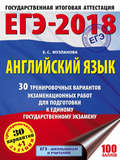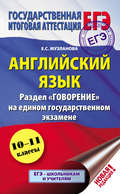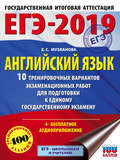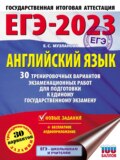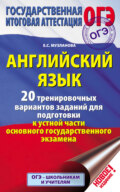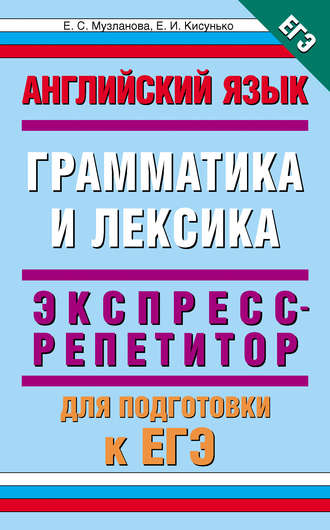
Е. С. Музланова
Английский язык. Экспресс-репетитор для подготовки к ЕГЭ. «Грамматика и лексика»
ВЕДЕНИЕ
Предлагаемый сборник тестовых заданий предназначен для формирования и контроля грамматических и лексических навыков и ориентирован, главным образом, на учащихся 10–11 классов и абитуриентов. Он поможет качественно подготовиться к итоговой государственной аттестации в форме ЕГЭ.
В пособие включен обширный лексический и грамматический материал, что позволяет использовать его на различных этапах обучения в школах с углубленным изучением языка, лицеях и гимназиях, а также при подготовке к экзаменам на получение международных сертификатов и к вступительным экзаменам в вузы.
Основная цель сборника – закрепить, обобщить и систематизировать знания, умения и навыки, приобретенные учащимися в рамках базового курса, а также овладеть определенным количеством нового материала в соответствии с требованиями государственного стандарта к надбазовому уровню владения иностранным языком.
Пособие составлено в соответствии с кодификатором элементов содержания по английскому языку, подготовленным Федеральным институтом педагогических измерений (ФИПИ). Каждый из разделов посвящен формированию одного из навыков, проверяемых на ЕГЭ. В разделах представлен краткий теоретический материал по теме, а также разнообразные задания для формирования и закрепления лексико-грамматических навыков. Сборник включает более 200 многоуровневых тестов, расположенных в порядке нарастания сложности, которые помогут прочно усвоить лексику и наиболее важные аспекты грамматики.
Поскольку в разделе «Грамматика и лексика» Единого Государственного Экзамена проверяется умение применять полученные знания при работе с иноязычными текстами, то в конце каждого раздела приводятся лексико-грамматические задания на базе аутентичных текстов, при работе с которыми учащиеся овладевают различными аспектами иноязычной культуры.
Раздел «Exam Practice» включает все типы лексико-грамматических заданий, входящих в ЕГЭ: определение требуемой грамматической формы заданного слова; определение однокоренного слова; выбор правильного варианта из четырех предложенных. Эти задания составлены на основе аутентичных материалов, максимально приближенных к формату единого государственного экзамена… Итоговый тест содержит 25 заданий, что позволяет легко оценить знания: 23–25 баллов – «отлично», 18–22 балла – «хорошо», 13–17 баллов – «удовлетворительно». Весь комплекс тестов имеет одну цель: активировать лексико-грамматический материал, изученный ранее на уроках, и подготовить учащихся к успешной сдаче единого государственного экзамена по английскому языку. Все тесты снабжены ключами, что позволяет использовать сборник для самоконтроля и самостоятельного изучения английского языка. Представленные в пособии тестовые задания были апробированы в московских школах и с успехом применяются на практике. Надеемся, что оно окажется полезным не только учащимся и учителям, но и всем желающим самостоятельно изучить английский язык.
При подготовке данного пособия автором были использованы следующие издания:
1. Luke Prodromou. Grammar and Vocabulary for First Certificate. – Pearson Education Limited, 2000.
2. Luke Prodromou. Rising Star. An Intermediate Course – Macmillan, 2005.
3. Michael Harris, David Mower, Anna Sikorzynska. Opportunities. – Pearson Education Limited, 2006.
4. N. Kenny, L. Luque – Mortimer. First Certificate Practice Tests. – Pearson Education, 2000.
5. Raymond Murphy. Englisc Grammar in Use. – Cambridge University Press, 1995.
6. Virginia Evans. Round-Up. – Pearson Education Limited, 1994.
7. Ионина А.А., Саакян А.С. Английская грамматика XXI века. Учебное пособие по английскому языку. – М.: Издательство «Менеджер», 2006. – 400 с.
8. Демоверсии ЕГЭ по английскому языку. – www.fipi.ru.
1. NOUNS
1.1. SINGULAR AND PLURAL NOUNS
Nouns are made plural by adding

Irregular plurals

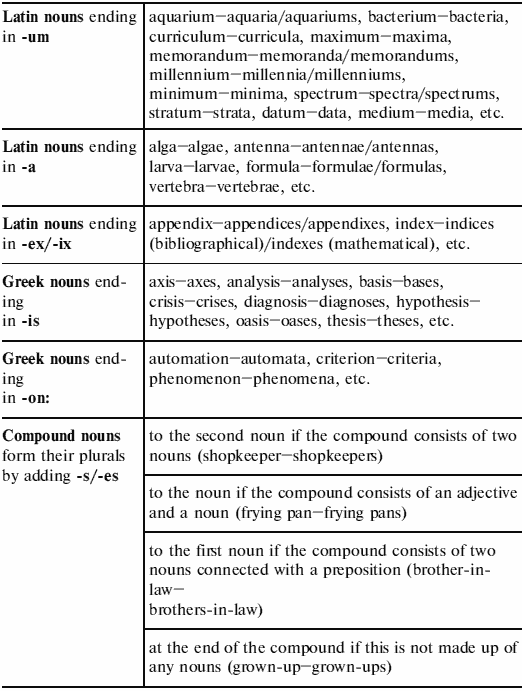
Test 1. Write the plural of the following nouns.
1. church – 8. woman – 15. radio —
2. difficulty – 9. deer – 16. ox —
3. mouse – 10. leaf – 17. fish —
4. month – 11. goose – 18. wolf —
5. child – 12. potato – 19. country —
6. roof – 13. foot – 20. tooth —
7. boy – 14. dress – 21. curriculum —
Test 2. Write the plural of the following nouns.
1. nanny – 8. radio – 15. violin —
2. father-in-law – 9. train robbery – 16. wife —
3. headache – 10. painkiller – 17. medium —
4. dictionary – 11. bush – 18. mouse —
5. pincushion – 12. pen-friend – 19. godfather —
6. hold-up – 13. video – 20. wish —
7. hoof – 14. pillowcase – 21. phenomenon —
Test 3. Write the plural of the following nouns.
1. deer – 8. sheep – 15. datum —
2. lady – 9. species – 16. Eskimo —
3. roof – 10. day – 17. leaf —
4. chief – 11. family – 18. life —
5. studio – 12. dish – 19. zero —
6. zoo – 13. paw – 20. buffalo —
7. bus – 14. fork – 21. criterion —
Test 4. Write the plural of the following nouns.
1. trout – 8. baby – 15. vowel —
2. composer – 9. handkerchief – 16. buzz —
3. insect – 10. church – 17. glass —
4. oasis – 11. memo – 18. man —
5. analysis – 12. ball game – 19. goose —
6. bacterium – 13. passer-by – 20. foot —
7. waiter – 14. letdown – 21. volcano —
Test 5. Write the plural of the following nouns.
1. bench – 8. scarf – 15. fruit —
2. celebrity – 9. belief – 16. swine —
3. louse – 10. sheep – 17. activity —
4. bath – 11. half – 18. thief —
5. woman – 12. tomato – 19. kilo —
6. cliff – 13. means – 20. party —
7. play – 14. photo – 21. appendix —
1.2. COUNTABLE AND UNCOUNTABLE NOUNS
Nouns can be countable (those that can be counted) or uncountable (those that can’t be counted). Uncountable nouns take a singular verb. The most common uncountable nouns are:
• Mass nouns: fluids (blood, tea, coffee, milk etc), solids (bread, butter, china, coal, food, fruit, glass, ice, iron, fish [meaning food], etc), gasses (air, oxygen, pollution, smoke, smog, etc), particles (corn, dust, flour, hair, pepper, rice, salt, sand, etc).
• Subjects of study: chemistry, economics, literature, mathematics, physics, etc.
• Languages: Chinese, English, French, etc.
• Games: billiards, chess, golf, soccer, tennis, etc.
• Diseases: flu, measles, mumps, etc.
• Natural phenomena: darkness, hail, heat, rain (but: the rains = season of continuous rain in tropical countries), humidity, thunder, snow, etc.
• Some abstract nouns: accommodation, advice, anger, applause, assistance, behaviour, business, chaos, countryside, courage, damage, dirt, education, evidence, housework, homework, information, intelligence, knowledge, luck, music, news, peace, progress, seaside, shopping, traffic, trouble, truth, wealth, work, etc.
• Collective nouns: baggage, cutlery, furniture, jewellery, luggage, machinery, money, rubbish, stationery, etc.
• Many uncountable nouns can be made countable by adding a partitive: a piece of paper/cake/advice/information/furniture; a slice/loaf of bread; a(n) item/piece of news, etc.
• Some nouns take only a plural verb. These are objects consisting of two parts: garments (pyjamas, trousers, etc), tools (scissors, etc), instruments (binoculars, compasses, spectacles, etc), or nouns such as: arms, ashes, barracks, clothes, congratulations, earnings, (good) looks, outskirts, people, police, premises, riches, stairs, surroundings, wages, etc.
• Group nouns refer to a group of people. These nouns can take either a singular or a plural verb depending on whether we see the group as a whole or as individuals. Such group nouns are: army, audience, class, club, committee, company, council, crew, crowd, headquarters, family, jury, government, press, public, staff, team, etc.
The team was the best. (the team as a group)
The team were all given medals. (each member separately as individuals)
• With expressions of duration, distance or money meaning ‘a whole amount’ we use a singular verb: Two years is long to wait. Three miles is a long way to go. Nine thousand pounds is a high price to pay.
Test 6. Fill in: is or are.
1. Your trousers _____ in the wardrobe.
2. Where______ his scissors?
3. There_____ a lecture on history today.
4. The shopping________ heavy.
5. Where_____ my gloves?
6. This information______ correct.
7. His hair_____ brown.
8. My socks_____ in the drawer.
9. Our furniture_____ very cheap.
10. His accommodation_____ luxurious.
11. Evidence_____ needed before the trial can continue.
12. The news_____ very exciting.
13. Mumps_____ a common illness among children.
14. My glasses_____ on the table.
15. Chinese_____ difficult to learn.
16. Where_____ the kitchen scales?
17. Billiards_____ a popular game.
18. His work_____ very interesting.
19. People_____ starving in some countries.
20. Education_____ the key to his success.
Test 7. Fill in: is or are.
1. Where_____ your trousers?
2. Could you tell me where_____ the scissors?
3. Tonight, there _____ athletics on TV.
4. Money_____ easy to spend and difficult to save.
5. Gloves_____ worn in cold weather.
6. This student’s knowledge_____ amazing.
7. Love_____ reason for much happiness.
8. This bread_____ stale.
9. Your jeans_____ on the chair.
10. His baggage_____ too heavy to carry.
11. Her advice _____ very interesting.
12. Mathematics_____ his favourite subject.
13. Measles_____ a common illness.
14. The glasses_____ on the table.
15. My sister’s hair_____ long.
16. Their bathroom scales_____ quite accurate.
17. Darts _____ a popular game in Britain.
18. This work_____ too hard.
19. People_____ unhappy with the new tax system.
20. The police_____ near.
Test 8. Choose the correct form of the verb.
1. Economics (is/are) his favourite subject.
2. The trousers he bought for her (doesn’t/don’t) fit her.
3. The police (want/wants) to interview men about the robbery.
4. Physics (was/were) my best subject at school.
5. Can I borrow your scissors? Mine (isn’t/aren’t) sharp enough.
6. The news (wasn’t/weren’t) as bad as we expected.
7. Where (does/do) your family live?
8. Four days (isn’t/aren’t) long enough for a good holiday.
9. He can’t find his binoculars. Do you know where (it is/they are)?
10. Do you think the people (is/are) happy with the government?
11. (Does/Do) the police know how the accident happened?
12. She doesn’t like hot weather. Twenty-eight degrees (is/are) too warm for her.
13. The staff at school (is/are) not happy with their new working conditions.
14. Thirty thousand pounds (was/were) stolen in the robbery.
15. Two years (is/are) a long time to be without job.
16. Five miles (is/are) a long way to walk every day.
17. I need more money. Six pounds (is/are) not enough.
18. These species (is/are) very rare.
19. My hair (is/are) dark brown.
20. His watch (need/needs) repairing.
Test 9. Choose the correct form of the verb.
1. All of her belongings (was/were) in a suitcase.
2. Athletics (is/are) very popular nowadays.
3. Aerobics (do/does) people a lot of good.
4. Chocolate (makes/make) you put on weight.
5. Most people (enjoy/enjoys) Easter.
6. The money she makes (is/are) enough for her.
7. The police (is/are) looking for the murderer.
8. His good looks (get/gets) him what he wants.
9. The government (is/are) passing new laws.
10. Her knowledge of English (is/are) very good.
11. Measles, which (is/are) a children’s disease, (is/are) dangerous for adults.
12. The audience (was/were) given free tickets.
13. The economics (is/are) very interesting.
14. His death (was/were) a great shock.
15. Fish (is/are) easy to look after as pets.
16. Radio news (give/gives) us less information than television news.
17. The stairs to the ground floor (was/were) over there.
18. The information (was/were) very helpful.
19. His glass (is/are) on the table.
20. There (is/are) toast on the dish.
2. PRONOUNS
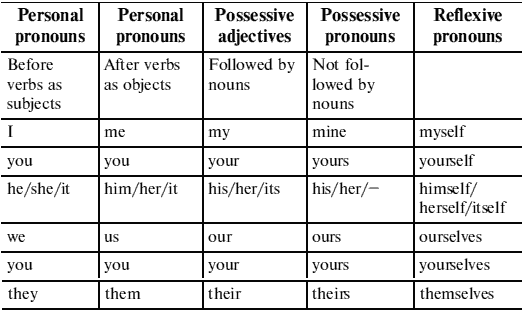
2.1. PERSONAL PRONOUNS
Test 1. Fill in the correct personal pronouns.
1. She is very handsome. I envy______.
2. They are not reliable. He doubts ______.
3. I taught her.______ learned it from ______.
4. We asked for his advice.______ advised______ not to come.
5. He dislikes her, and______ hates ______, it’s evident.
6. You should be there on time. I want______ to come on time.
7. She is from England,______ gave me lessons in English.
8. They are our friends. We invited______ to the party.
9. He wrote this letter. I recognized______ by his handwriting.
10. ‘Did you see the snake?’ ‘Yes, I saw______ and ______saw______.’
11. ‘Where’s Tom?’ ‘That’s ______over there.’
12. ‘Where’s my map?’ ‘I left ______on the desk.’
13. Look at that bird. ______always comes to my window.
14. ‘What time is ______?’ ‘______ is four.’
15. ‘Who is that?’ ______‘ ’s me.’
16. Hi, it is so nice to see ______again.
17. ______doesn’t matter.
18. I like when ______’s warm.
19. I find______ difficult to explain anything to him.
20. You are not guilty of ______, are you?
Test 2. Fill in the correct personal pronouns.
1. Who is that woman? Why are you looking at ______?
2. Do you know that man? I work with ______.
3. I’m talking to you. Please listen to ______.
4. These books are interesting. Do you want to look at ______?
5. He likes that camera. He’s going to buy ______.
6. Where are the tickets? I can’t find ______.
7. We’re going out. You can go with ______.
8. I don’t like dogs. I’m afraid of ______.
9. Where is he? I want to talk to ______.
10. These plums are bad. Don’t eat ______.
11. I want those pencils. Please give______ to ______.
12. They want the money. Please give______ to ______.
13. He wants the key. Please give______ to______.
14. He never drinks milk. He doesn’t like ______.
15. I often go to the parties. ______like ______.
16. ‘Where are my glasses?’ ‘______ are on the table.’
17. Where’s Dan? I want to talk to ______.
18. We’re going shopping. Do you want to go with ______?
19. I want to see him but______ doesn’t want to see ______.
20. I don’t know those people. Do you know ______?
2.2. POSSESSIVE PRONOUNS
Test 3. Fill in the correct possessive pronouns.
1. This book belongs to me. This is ______book.
2. The man put______ hand into pocket.
3. The cat ate______ food.
4. She took out______ purse and gave it to me.
5. My husband never wears______ glasses.
6. This is their car. That other car is______ too.
7. May I introduce to you one of______ colleagues?
8. There were a lot of people coming back from ______work.
9. Every season is beautiful in ______own way.
10. They would like a house of______ own.
11. I’ll try______ best, I promise.
12. Each country has______ own customs.
13. He cut______ finger this evening.
14. Lend me______ pen, I’ve lost ______.
15. They’re going to London with some students of ______.
16. This is not my pencil, ______is red.
17. I haven’t got a pen. Can you give me ______?
18. Take off______ coat, please.
19. I saw them. This is______ car.
20. Ann is married.______ husband works in a bank.
Test 4. Fill in the correct possessive pronouns.
1. They have two children but I don’t remember______ names.
2. I often see that man but I don’t know______ name.
3. Pete is a teacher but______ sister is a nurse.
4. Do you like______ job?
5. Do you think that most people are happy in ______jobs?
6. Put on______ hat when you go out.
7. We are going to invite all______ friends to the party.
8. ______favourite sport is tennis. She plays a lot in summer.
9. He didn’t have an umbrella, so she gave him ______.
10. He was very happy because we invited him to stay with us in______ house.
11. You’ll give me your address and I’ll give you ______.
12. I gave him my address and he gave me ______.
13. I saw Liz and Philip with______ son, Bill.
14. He invited Ann with ______parents.
15. We live with ______parents.
16. Oxford is famous for______ university.
17. I can’t find ______ticket.
18. The County of Kent is famous for______ gardens.
19. My sister plays tennis too but______ favourite sport is basketball.
20. Mr and Mrs Brown live in Paris but______ son lives in London.
Test 5. Fill in my, your, his, her, our.
Dear Sally,
Thank you for ______(1) letter. I’m fine and I hope that you and ______(2) parents are fine too. In your letter you ask me who helps me with ______(3) homework. I’ve got a brother, but he never helps me with ______(4) homework. My friend Joan has got a brother too and he always helps her with ______(5) homework, but then she helps him with cleaning ______(6) room. We do a lot of homework because ______(7) Maths teacher and ______(8) English teacher are very strict. ______(9) parents think it is okay to have a lot of homework. They always say, ‘ ______(10) teachers were strict too, and so we learned a lot.’ Well, so what can I do? Joan’s parents say that she needs some free time so that she can play or meet ______(11) friends. Thank you for ______(12) photo. I think you look so sweet.
Bye. I hope to hear from you soon.
Love,
Sarah



